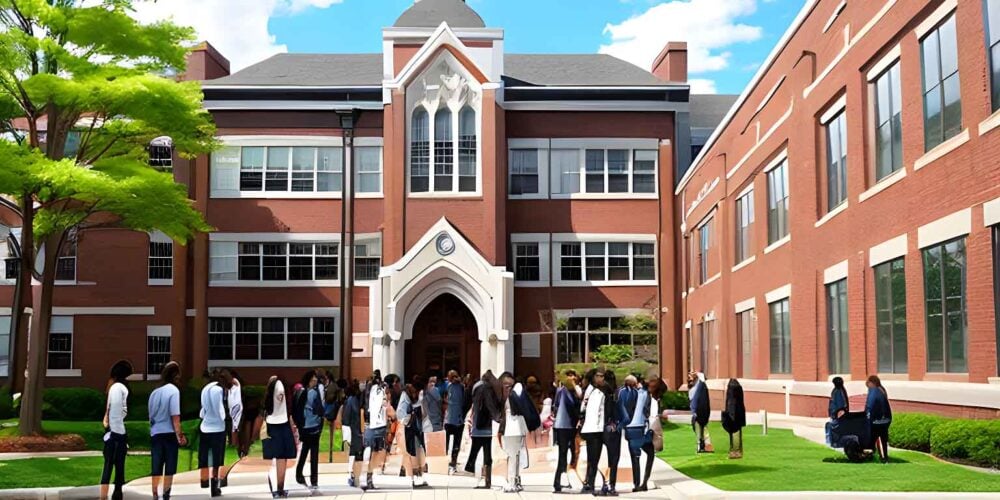
这篇文章讨论了美国最高法院就大学录取中考虑种族和族裔因素的裁决,布朗大学校长对该裁决表示失望,强调多样性对大学使命的重要性。文中提到布朗大学将进行法律审查,寻找合法推动多样性的策略,以维护教育质量和学生体验。裁决影响了美国大学招生政策,增加了不确定性,同时挑战了对多样性和平等行动的维护。对高等教育来说,如何平衡多样性与平等行动仍是一个挑战,且裁决可能对国际学生申请美国大学产生影响。最后,为了继续促进多样性,美国大学需要通过其他途径如招生要求、奖学金计划等来实现。整篇文章涵盖了法律、教育及社会多样性等方面,阐述了美国大学在面对裁决时的挑战和应对策略。全文阅读大约需要5分钟。*
在美国最高法院就大学录取中考虑种族和族裔因素的问题做出期待已久的裁决后,布朗大学校长克里斯蒂娜·H·帕克森对该裁决表示深感失望,认为裁决反对了在大学录取中综合考虑种族的做法。她强调了大学遵守法律的承诺,同时也要维护多样性,因为多样性是大学使命的核心。
帕克森在6月29日致布朗社区的一封信中表示,大学将投入时间,在今年夏季对这份长达237页的意见进行彻底的法律审查。鉴于这项裁决颠覆了数十年的先例,大学领导将专注于确定在招收才华横溢、多样化的学生群体方面可以遵循的策略,并为学术和行政单位提供资源和指导,以了解法院裁决对布朗项目和活动的影响。
帕克森写道:“在我们分析这些决定的同时,我想强调布朗坚定地致力于推动多样性,这对于实现最高学术水准、培养我们的学生在一个复杂世界中成长和领导至关重要。”她补充道:“我们知道,当人们在受到支持和尊重的环境中共同学习和工作时,布朗才能更加强大。这将在布朗继续下去。”
这项裁决源于两起法律案件,这些案件质疑哈佛大学和北卡罗来纳大学在录取中采用种族意识政策的合法性。布朗大学在多个阶段向法院提交了友情陈词,支持在高等教育录取中使用平权行动,并指出多样化的学生群体对丰富所有学生的教育经验的重要性。但最终美国最高法院还是否决了美国大学的平权行动。

布朗大学校长信件的原文如下:
Dear Members of the Brown Community,
Across more than 20 years, Brown University has joined no less than eight amicus briefs in support of the use of affirmative action in higher education admissions. Our values have remained constant. We believe that the student body diversity is essential to achieving our educational mission. We have consistently argued that the consideration of race as one of many factors in achieving a diverse student body enriches the educational experience for all.
In a 2018 brief, we made clear that engaging with others of varying backgrounds and perspectives compels students to test and question — question their assumptions, test what is put forth as universal “truth,” and build understanding about the value of difference in translating and navigating society. It’s under these conditions that learning and the advancement of knowledge thrive.
Given Brown’s long history of support for affirmative action in admissions, I am deeply disappointed in the Supreme Court ruling that was issued earlier today, which has upended decades of precedent. In the cases Students for Fair Admissions v. President and Fellows of Harvard and Students for Fair Admissions v. University of North Carolina that challenged the lawfulness of race-conscious admissions programs, the court ruled that the consideration of race among the factors in admitting students to universities is unlawful.
Today’s decision raises questions about how Brown and other institutions of higher education will continue to fulfill vitally important commitments to access and diversity. And we know and understand that some in our community may feel the impact of the court’s decisions in personal ways. Given the complexity and volume of the decision, it is too soon to say with certainty or specificity how the court’s decision might affect Brown. Like other colleges and universities, we have begun immediately conducting a thorough legal review of the 237-page opinions in the two cases. This will take time.
As we analyze the decisions, I want to underscore that Brown is and will remain firmly committed to advancing the diversity that is central to achieving the highest standards of academic excellence and preparing our students to grow and lead in a complex world.
The Path Ahead at Brown
The University is committed to complying with the law, while also sustaining the diversity that is central to Brown’s mission. To that end, a group of senior administrators and faculty has been meeting for several months to plan for possible changes in the law in anticipation of the court’s decision. We have also consulted with experts and peer institutions where race and ethnicity considerations are banned by state law to determine the success of lawful strategies in achieving racial and ethnic diversity.
Over the summer, we will conduct a close review of the SCOTUS decision to determine which of the various strategies for recruiting, admitting and yielding a talented, diverse student body we can follow. Once this review is complete, the Office of the Provost will provide resources and guidance to all academic and administrative units at Brown that have an admission application or entry criteria for their programs or activities. Units that need to make decisions about admissions strategies before this work is complete should contact the Office of the Provost.
The bottom line — We know that Brown is strongest when people learn and work together in environments in which they are fully included, supported and respected for who they are. This will continue at Brown.
Sincerely,
Christina H. Paxson
President
参考资料:
- Brown president responds to Supreme Court’s decision on affirmative action
- 美国最高法院否决了美国大学的平权行动——该案涉及哈佛大学和北卡大学
潜在问题:
1. 这项裁决对美国大学的招生政策和录取标准会有什么具体影响?
2. 布朗大学如何在保持遵守法律的前提下继续推动学生多样性?
3. 为什么布朗大学校长对最高法院的裁决感到失望?
4. 哪些因素使得美国最高法院做出这样的裁决?
5. 对高等教育来说,多样性和平等行动有多重要?这两者之间如何平衡?
6. 这项裁决对在美国留学的国际学生会有怎样的影响?
7. 哪些是美国大学可以继续追求多样性和包容性的策略和措施?
8. 这项裁决对公立大学和私立大学的影响是否会有所不同?
答案:
1. 这项裁决可能会迫使美国大学重新评估他们的招生政策,特别是关于考虑种族因素的部分。一些学校可能需要调整录取标准以确保符合法律规定,同时维持学生多样性。
2. 布朗大学将继续遵守法律,同时通过各种策略寻找合法的方法来推动学生多样性。他们会进行详尽的法律审查,并提供资源和指导,以确保招生政策仍能促进多样性。
3. 布朗大学校长对最高法院的裁决感到失望,因为这一裁决颠覆了多年来支持正面行动的先例,这是对大学多样性和包容性的一个挑战。
4. 美国最高法院做出这一裁决是基于对两起法律案件的审查,这些案件质疑了大学在录取中采用种族意识政策的合法性。最终法院认为考虑种族在大学录取中是不合法的。
5. 对高等教育来说,多样性和平等行动是非常重要的。多样性可以丰富学生的学习经验,推动知识的进步。然而,如何在保持平等的前提下实现多样性仍然是一个挑战。
6. 这项裁决可能会影响在美国留学的国际学生,因为影响到大学录取政策可能会改变国际学生的入学机会。
7. 美国大学可以通过其他多元化的途径来继续追求多样性,如通过招生要求、奖学金计划、多样性培训等方式来吸引不同背景的学生。
8. 公立大学和私立大学可能会因为不同的法律规定和招生政策,在面对这项裁决时有所不同的影响。公立大学可能会受到州法律的限制,而私立大学则有更大的自主权。
*简介与问答内容由人工智能chatGPT根据文章内容总结发散,仅供参考,如有冲突请以正文内容为准
【独家稿件声明】本文为美国续航教育(Forward Pathway LLC,官网地址:www.forwardpathway.com)原创,未经授权,任何媒体和个人不得全部或者部分转载。如需转载,请与美国续航教育联系;经许可后转载务必请注明出处,违者本网将依法追究。
美国续航教育总部位于美国加利福尼亚州洛杉矶,同时在中国上海和深圳设有续航教育分部。续航教育自2013年成立以来,致力于研究中美之间的文化教育发展与趋势,提供最专业的美国留学一站式服务,获得美国国际招生协会AIRC及国际教育顾问委员会ICEF的双重认证。
觉得有用的话就评价/分享一下吧~





